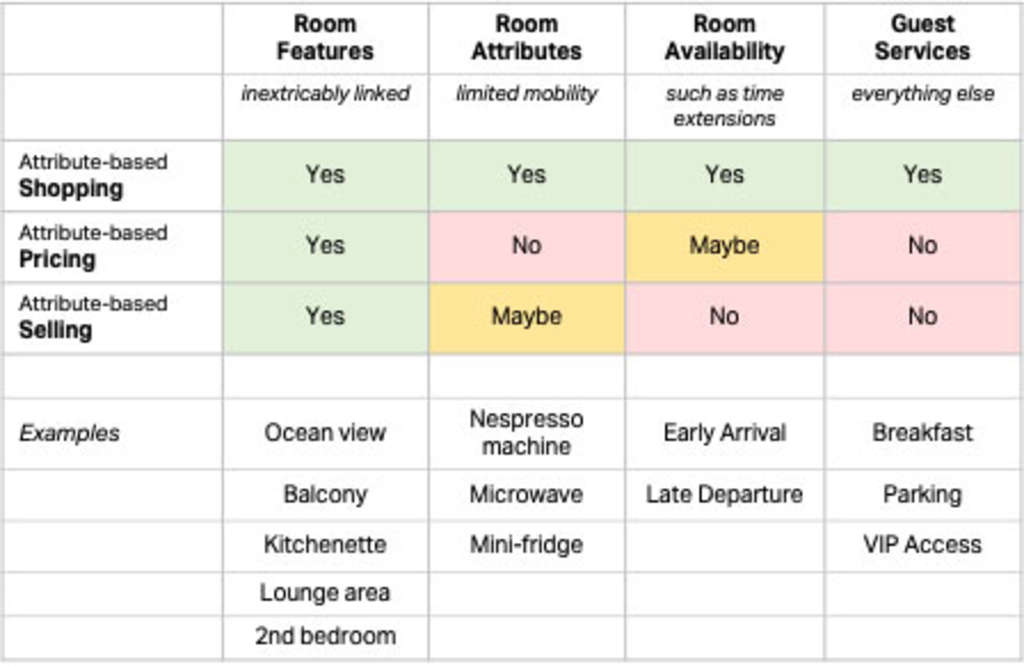For years, many in the hotel industry have talked about Attribute Based Selling (ABS).
NB: This is an article from Roomdex, one of our Expert Partners
It has been discussed at conferences and in webinars with many claiming it is the way of the future that looks like the way of the past, while other claim it is currently in action out in the market. All of this begs the question of what exactly it is.
Subscribe to our weekly newsletter and stay up to date
Most will tell you that ABS promises to give customers a method to purchase products in a way that better match their individual desires, with the benefit of driving more revenue for the seller. In a way, ordering a custom pizza with the toppings you like is a method of ABS.
But when it comes to hotel and their array of assets, the definition of ABS has become blurred. Depending on who you speak to, you may actually be talking about attribute-based shopping or attribute-based pricing. We think it’s time to sort this all out once and for all.
The Benefit of True Attribute-Based Selling
With attribute-based selling, hoteliers can sell every room attribute separately. Instead of the traditional method of offering rooms by room type, a hotel could “un-categorize” its inventory and allow guests to pick only the features they value.
As George Roukas noted, “Attributes [currently] contribute to the value of a room in the mind of a guest, but they are not offered individually— only in bundles.” ABS gives guests the opportunity to build their ideal room and control their purchase path by allowing them to pay for the room attributes they value. As our own Pierre Boettner put it, “ABS makes the buying process not just simpler and pricing more transparent, it avoids false choice paradoxes and instantly increases satisfaction.”
Attribute Based Selling: What is an Attribute?
If you were to look in the Oxford English dictionary, it defines “attribute” as “a quality or feature regarded as a characteristic or inherent part of someone or something.” By this definition, when you book a hotel room, that stay experience encompasses many attributes. For example, a king bed is certainly a feature. But then you can also consider a kitchen, espresso machine or balcony a feature. However, attributes that you may desire in a room might include a high floor room, or ocean view or a room near the elevator. And you are certainly pricing and selling stay attributes if you sell parking or a baby crib.
So, if you permit guests to rent a children’s cot for a room, you are doing Attribute-based Selling, right? Technically, yes, but you may not be getting all the revenue you can from this practice because you are not addressing the hardest part of ABS.
George Roukas of Hudson Crossing said of room attributes, “Every hotel operates using a select number of pre-set room types, but not all of those rooms have the same attributes. Some rooms are on high floors while others are not, bedding types differ, sizes differ, views differ, and a room’s location relative to stairways or elevators can also be a sellable room attribute.”
In its purest form, ABS is about room features that are immutable and attached to the room, notroom services. So, items such as bedding configuration, square footage, a particular layout, specific views, features such as a fireplace, a balcony, high ceilings, or distance to the elevator – these are attributes that are completely fixed and “glued” to an individual bedroom.
On the other hand, while items such as a meal plan, a massage, champagne sent to the room, golf tee times, etc. are products that can be pre-sold and added to the reservation, they are not an inherent part of the actual room. Similarly, items in the room that are “moveable”, such as an espresso machine or even a fridge, can also be included as part of an overall attribute-based shopping experience but they are not true room attributes.
Shopping, Pricing and Selling
Let’s be clear: the goal is to maximize the revenue from all your hotel assets regardless of whether they are ‘true’ room attributes or not. However, to do so requires us to make sure we understand exactly what we are selling. Below is a chart that begins to define hotel products:
Here, you can see that we define Attribute-based Shopping as an experience that encompasses the selling of all your hotel products. Think of Attribute-based Pricing the way a revenue manager thinks of reservation pricing – the flexible yielding of attribute pricing based on a variety of market conditions. Your mini-fridge will most likely always have a flat fee, while a stay extension may have a fee that flexes with demand. Physical room attributes such as a balcony, have demand-based pricing just as the room itself currently does. Finally, Attribute-based Selling is now defined as selling room features.
To further define our products, we should be clear about the difference between characteristics of the stay vs. characteristics of the room product itself:
The distinction here is important as we craft shopping experiences for the guest. The guest cares about building a stay experience, but less about what the building blocks are called. The hotelier needs to define the building blocks to be able to accurately determine availability and pricing.
A Financial Opportunity Awaits
Of course, ABS is not just about better aligning customer needs. It’s about better managing the assets of a hotel to maximize their value. Any revenue manager will tell you that a hotel that does no yielding of room prices leaves money on the table, because those room are not being managed to take advantage of changing demand. The same holds true for room features. Because people have not purchased any of the attributes that are attached to that bedroom, but are yet occupying it, the maximized value of those assets are lost for the room night that the bedroom is occupied. That’s the big opportunity. There are tons of attributes that get diluted because they are not managed. And that’s not about add-ons or fridges or time extensions and so on. It’s about the views, the balconies, etc. – all the features that are inextricably linked to a room. Because, with the right technology, attributes can be dynamically priced based on demand, it is possible for a standard room rate to rise to that of a higher room type. ABS has the real potential to increase total hotel revenue.
With so much promise and opportunity to be had, why after so much time has attribute-based selling never really come to fruition? Stay tuned. We have the answer.







